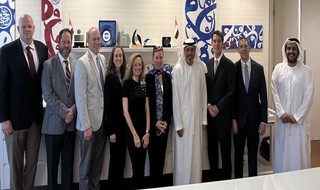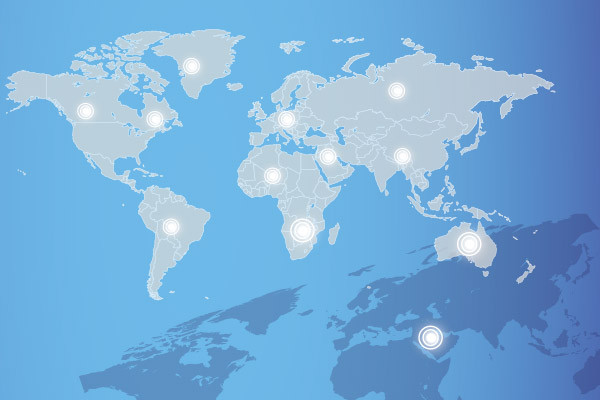The Path to Stability in the Middle East: Tolerance, Geo-Economics, and Revolutions 2.0
This report is based on a discussion with members of National War College to B`huth who visited our head office in Dubai on March 30th, 2023.

- by Khalid Al Shimmari ,
- Monday, 22nd May, 2023
The visit of a member of National War College researchers to a Think Tank in Dubai provided an opportunity to exchange views on the challenges and opportunities facing the Middle East region. The conversation focused on whether the region is currently experiencing another phase of instability that can be addressed using the toolbox of security alliances and geopolitical diplomacy, or whether a new philosophy is emerging that doesn’t follow these rules.
Since most of the researchers have served with the US armed forces in the Middle East, either in Iraq, Syria, or Afghanistan; they all had to work with policies regarding Iran. Therefore, the shift in the way the GCC approaches Iran, manifested in the Beijing brokered agreement between Saudi Arabia and Iran was at the heart of the discussion.
The knee jerk reaction to the agreement, led to explanations, such as abandoning traditional allies or fear of the US withdrawal after the famous “pariah state” description of Saudi, which perceive the rapprochement as emotional without any strategic dimension.
One way to process this “change” is seeing the link between foreign policies and public policies in Gulf countries. For instance, understanding the strategic significance of the Abrahamic Accords as a regional de-conflicting strategy requires understanding how UAE developed its tolerance policies. The UAE domestic policies of tolerance aimed at preventing religious extremism internally, but it also applies to its foreign policy based on preventing religious identity conflicts.
Same can be said about the shift in Saudi Arabia's foreign policy towards Iran. Saudi is now pivoting away from the strategic competition for regional supremacy based on the identity conflict between Sunni and Shia, ushered by the Dual Containment Strategy, to principles of geo-economics based on cooperation and connectivity agendas. This shift, which has its roots in a Crown Prince Mohammed bin Salman Vision 2030, changed the national priorities and consequently effected the change in foreign policy towards Iran.
Inside Iran, the experiences of countries like the UAE and Saudi Arabia in development and moving away from geopolitical competition based on religious identity will undoubtedly contribute to a change in power dynamics. The current demonstrations in Iran may not only be about the hijab but also about Iran's need, both as a nation and a state, to elevate its development policies to match those of neighbouring countries, including social reforms. A first steps towards that is to regain connectivity with its neighbouring Arab States.
In the Arab Gulf countries, the US strategy of "regime change", is no longer valid. It has effectively supported the narrative that they are natural enemies to Iran and violated the long-standing concept of non-interference in domestic affairs. Instead, the focus should be on prioritizing engagement with Iran "as a state". Building state to state areas of cooperation can eventually reduce Iran’s reliance on non-state actors as means of engagement.
This has a better chance of success with a shift in US strategy from regime change towards regime modernization. This could start with economic reforms that could have social and political implications which will help to integrate Iran into the international community.
A digitally connected Iran will be more open, economically and socially. Digital collaboration between Iran, other countries in the region, and the world at large, can accelerate modernization of Iran's policies and inspire a new generation of Iranians to see themselves as part of the world. This is the lesson Iran may learn from the impact of Saudi Arabia's Vision 2030, and the way it has responded to the aspirations of a new generation of young Saudis, a generation that is similar to that in Iran.
Changing the basis of relations in the region from relying on geopolitics to geo-economics will have a broader impact on the means of maintaining influence. Whether it is influence in Syria, Iraq, or Yemen, Iran can have more significant diplomatic influence through economic channels than by gaining influence through religious armed organizations.
Such a transformation in approach has already happened in Iraq. GCC countries have changed its approach to Iraq from seeing it through the prism of sectarian hegemony to augmenting state to state relations and focusing on global challenges. The same approach is now driving the mediation in Yemen and normalization with Syria.
The United States may have a significant opportunity to lead this transformation, especially since the dual containment policy towards Iran has failed. It can do so by supporting a positioning of Iran where it sees its interests rooted in dealing with the world as an international player, rather than dealing with Iran as an outcast state that can only survive in an underworld that extends from smuggling to terrorism.
Such a shift in strategy will require the United States to understand better the transformations happening in the region, starting from the Abraham Accords to the Saudi-Iranian rapprochement, and seeing it from the prism of opportunity rather than that of risk. Opportunities that can be achieved through creating cooperative frameworks with everyone, rather than maintaining gravitational alliance.

Khalid Al Shimmari
Seinor Researcher

